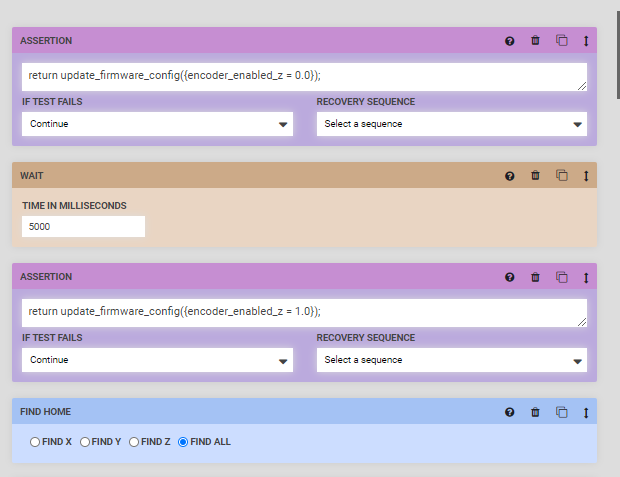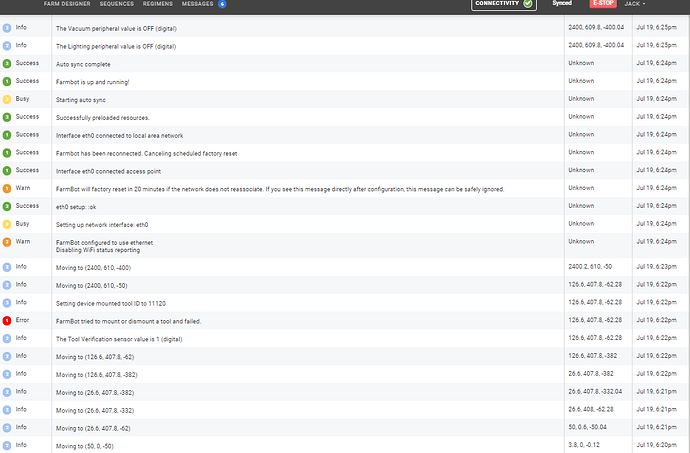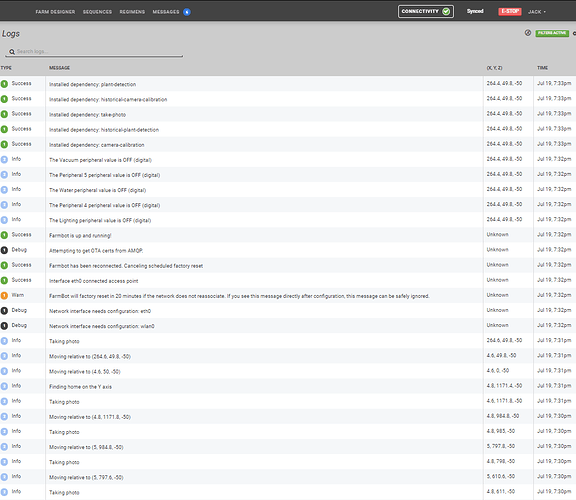Thanks @jsimmonds - I took a break and grabbed the logs. Odd. Sitting there with no activity and then my SSH connection disconnects as the FarmBot reboots.
Jack
Interactive Elixir (1.9.0) - press Ctrl+C to exit (type h() ENTER for help)
iex(farmbot@farmbot-00000000c6b8bd5b.local)1> RingLogger.attach
e[33me[36m:oke[0me[33me[0m
iex(farmbot@farmbot-00000000c6b8bd5b.local)2> e[46D e[46De[22m
15:59:16.330 [info] Child {:server, :ssh_server_channel_sup, {0, 0, 0, 0}, 22} of Supervisor #PID<0.8967.0> (:ssh_subsystem_sup) started
Pid: #PID<0.8968.0>
Start Call: :ssh_server_channel_sup.start_link(%{pref_public_key_algs: [:“ecdsa-sha2-nistp384”, :“ecdsa-sha2-nistp521”, :“ecdsa-sha2-nistp256”, :“ssh-ed25519”, :“ssh-ed448”, :“ssh-rsa”, :“rsa-sha2-256”, :“rsa-sha2-512”, :“ssh-dss”], socket_options: [], auth_method_kb_interactive_data: :undefined, max_random_length_padding: 15, negotiation_timeout: 120000, minimal_remote_max_packet_size: 0, connectfun: #Function<42.74051636/3 in :ssh_options.default/1>, idle_time: :infinity, user_dir_fun: :undefined, transport: {:tcp, :gen_tcp, :tcp_closed}, vsn: {2, 0}, ssh_cli: :undefined, internal_options: %{lsocket: {#Port<0.113>, #PID<0.2317.0>}}, max_sessions: :infinity, tstflg: [], key_cb: {Nerves.Firmware.SSH.Keys, [authorized_keys: [{{:RSAPublicKey, REDACTED MY KEY’]}]]}, send_ext_info: true, preferred_algorithms: [kex: [:“ecdh-sha2-nistp384”, :“ecdh-sha2-nistp521”, :“ecdh-sha2-nistp256”, :“diffie-hellman-group-exchange-sha256”, :“diffie-hellman-group16-sha512”, :“diffie-hellman-group18-sha512”, :“diffie-hellman-group14-sha256”, :“curve25519-sha256”, :"curve25519-sha256@libssh.org", :“curve448-sha512”, :“diffie-hellman-group14-sha1”, :“diffie-hellman-group-exchange-sha1”], public_key: [:“ecdsa-sha2-nistp384”, :“ecdsa-sha2-nistp521”, :“ecdsa-sha2-nistp256”, :“ssh-ed25519”, :“ssh-ed448”, :“ssh-rsa”, :“rsa-sha2-256”, :“rsa-sha2-512”, :“ssh-dss”], cipher: [client2server: [:“chacha20-poly1305@openssh.com”, :"aes256-gcm@openssh.com", :“aes256-ctr”, :“aes192-ctr”, :"aes128-gcm@openssh.com", :“aes128-ctr”, :“aes256-cbc”, :“aes192-cbc”, :“aes128-cbc”, :“3des-cbc”], server2client: [:“chacha20-poly1305@openssh.com”, :"aes256-gcm@openssh.com", :“aes256-ctr”, :“aes192-ctr”, :"aes128-gcm@openssh.com", :“aes128-ctr”, :“aes256-cbc”, :“aes192-cbc”, :“aes128-cbc”, :“3des-cbc”]], mac: [client2server: [:“hmac-sha2-256”, :“hmac-sha2-512”, :“hmac-sha1”], server2client: [:“hmac-sha2-256”, :“hmac-sha2-512”, :“hmac-sha1”]], compression: [client2server: [:none, :"zlib@openssh.com", :zlib], server2client: [:none, :"zlib@openssh.com", :zlib]]], id_string: {:random, 2, 5}, auth_methods: ‘publickey,keyboard-interactive,password’, failfun: #Function<40.74051636/3 in :ssh_options.default/1>, dh_gex_limits: {0, :infinity}, infofun: #Function<44.74051636/3 in :ssh_options.default/1>, system_dir: ‘/srv/erlang/lib/nerves_firmware_ssh-0.4.4/priv’, password: :undefined, user_dir: false, unexpectedfun: #Function<15.74051636/2 in :ssh_options.default/1>, user_passwords: [], dh_gex_groups: :undefined, subsystems: [{‘sftp’, {:ssh_sftpd, []}}], profile: :default, user_options: [id_string: :random, key_cb: {Nerves.Firmware.SSH.Keys, [authorized_keys: [{{:RSAPublicKey, REDACTED MY KEY’]}]]}, system_dir: ‘/srv/erlang/lib/nerves_firmware_ssh-0.4.4/priv’, shell: {IEx, :start, []}], modify_algorithms: :undefined, parallel_login: false, pwdfun: :undefined, max_channels: :infinity, ssh_msg_debug_fun: #Function<17.74051636/4 in :ssh_options.default/1>, exec: :undefined, rekey_limit: {3600000, 1024000000}, recv_ext_info: true, shell: {IEx, :start, []}, disconnectfun: #Function<13.74051636/1 in :ssh_options.default/1>})
Restart: :temporary
Shutdown: :infinity
Type: :supervisor
e[0miex(farmbot@farmbot-00000000c6b8bd5b.local)2> e[46D e[46De[22m
15:59:16.337 [info] Child {:server, :ssh_connection_sup, {0, 0, 0, 0}, 22} of Supervisor #PID<0.8967.0> (:ssh_subsystem_sup) started
Pid: #PID<0.8969.0>
Start Call: :ssh_connection_sup.start_link(%{pref_public_key_algs: [:“ecdsa-sha2-nistp384”, :“ecdsa-sha2-nistp521”, :“ecdsa-sha2-nistp256”, :“ssh-ed25519”, :“ssh-ed448”, :“ssh-rsa”, :“rsa-sha2-256”, :“rsa-sha2-512”, :“ssh-dss”], socket_options: [], auth_method_kb_interactive_data: :undefined, max_random_length_padding: 15, negotiation_timeout: 120000, minimal_remote_max_packet_size: 0, connectfun: #Function<42.74051636/3 in :ssh_options.default/1>, idle_time: :infinity, user_dir_fun: :undefined, transport: {:tcp, :gen_tcp, :tcp_closed}, vsn: {2, 0}, ssh_cli: :undefined, internal_options: %{lsocket: {#Port<0.113>, #PID<0.2317.0>}}, max_sessions: :infinity, tstflg: [], key_cb: {Nerves.Firmware.SSH.Keys, [authorized_keys: [{{:RSAPublicKey, REDACTED MY KEY’]}]]}, send_ext_info: true, preferred_algorithms: [kex: [:“ecdh-sha2-nistp384”, :“ecdh-sha2-nistp521”, :“ecdh-sha2-nistp256”, :“diffie-hellman-group-exchange-sha256”, :“diffie-hellman-group16-sha512”, :“diffie-hellman-group18-sha512”, :“diffie-hellman-group14-sha256”, :“curve25519-sha256”, :"curve25519-sha256@libssh.org", :“curve448-sha512”, :“diffie-hellman-group14-sha1”, :“diffie-hellman-group-exchange-sha1”], public_key: [:“ecdsa-sha2-nistp384”, :“ecdsa-sha2-nistp521”, :“ecdsa-sha2-nistp256”, :“ssh-ed25519”, :“ssh-ed448”, :“ssh-rsa”, :“rsa-sha2-256”, :“rsa-sha2-512”, :“ssh-dss”], cipher: [client2server: [:“chacha20-poly1305@openssh.com”, :"aes256-gcm@openssh.com", :“aes256-ctr”, :“aes192-ctr”, :"aes128-gcm@openssh.com", :“aes128-ctr”, :“aes256-cbc”, :“aes192-cbc”, :“aes128-cbc”, :“3des-cbc”], server2client: [:“chacha20-poly1305@openssh.com”, :"aes256-gcm@openssh.com", :“aes256-ctr”, :“aes192-ctr”, :"aes128-gcm@openssh.com", :“aes128-ctr”, :“aes256-cbc”, :“aes192-cbc”, :“aes128-cbc”, :“3des-cbc”]], mac: [client2server: [:“hmac-sha2-256”, :“hmac-sha2-512”, :“hmac-sha1”], server2client: [:“hmac-sha2-256”, :“hmac-sha2-512”, :“hmac-sha1”]], compression: [client2server: [:none, :"zlib@openssh.com", :zlib], server2client: [:none, :"zlib@openssh.com", :zlib]]], id_string: {:random, 2, 5}, auth_methods: ‘publickey,keyboard-interactive,password’, failfun: #Function<40.74051636/3 in :ssh_options.default/1>, dh_gex_limits: {0, :infinity}, infofun: #Function<44.74051636/3 in :ssh_options.default/1>, system_dir: ‘/srv/erlang/lib/nerves_firmware_ssh-0.4.4/priv’, password: :undefined, user_dir: false, unexpectedfun: #Function<15.74051636/2 in :ssh_options.default/1>, user_passwords: [], dh_gex_groups: :undefined, subsystems: [{‘sftp’, {:ssh_sftpd, []}}], profile: :default, user_options: [id_string: :random, key_cb: {Nerves.Firmware.SSH.Keys, [authorized_keys: [{{:RSAPublicKey, REDACTED MY KEY’]}]]}, system_dir: ‘/srv/erlang/lib/nerves_firmware_ssh-0.4.4/priv’, shell: {IEx, :start, []}], modify_algorithms: :undefined, parallel_login: false, pwdfun: :undefined, max_channels: :infinity, ssh_msg_debug_fun: #Function<17.74051636/4 in :ssh_options.default/1>, exec: :undefined, rekey_limit: {3600000, 1024000000}, recv_ext_info: true, shell: {IEx, :start, []}, disconnectfun: #Function<13.74051636/1 in :ssh_options.default/1>})
Restart: :temporary
Shutdown: :infinity
Type: :supervisor
e[0miex(farmbot@farmbot-00000000c6b8bd5b.local)2> e[46D e[46De[22m
15:59:16.345 [info] Child #Reference<0.1468177200.806092801.84242> of Supervisor :“ssh_system_0.0.0.0_22_default_sup” started
Pid: #PID<0.8967.0>
Start Call: :ssh_subsystem_sup.start_link(:server, {0, 0, 0, 0}, 22, :default, %{pref_public_key_algs: [:“ecdsa-sha2-nistp384”, :“ecdsa-sha2-nistp521”, :“ecdsa-sha2-nistp256”, :“ssh-ed25519”, :“ssh-ed448”, :“ssh-rsa”, :“rsa-sha2-256”, :“rsa-sha2-512”, :“ssh-dss”], socket_options: [], auth_method_kb_interactive_data: :undefined, max_random_length_padding: 15, negotiation_timeout: 120000, minimal_remote_max_packet_size: 0, connectfun: #Function<42.74051636/3 in :ssh_options.default/1>, idle_time: :infinity, user_dir_fun: :undefined, transport: {:tcp, :gen_tcp, :tcp_closed}, vsn: {2, 0}, ssh_cli: :undefined, internal_options: %{lsocket: {#Port<0.113>, #PID<0.2317.0>}}, max_sessions: :infinity, tstflg: [], key_cb: {Nerves.Firmware.SSH.Keys, [authorized_keys: [{{:RSAPublicKey, REDACTED MY KEY’]}]]}, send_ext_info: true, preferred_algorithms: [kex: [:“ecdh-sha2-nistp384”, :“ecdh-sha2-nistp521”, :“ecdh-sha2-nistp256”, :“diffie-hellman-group-exchange-sha256”, :“diffie-hellman-group16-sha512”, :“diffie-hellman-group18-sha512”, :“diffie-hellman-group14-sha256”, :“curve25519-sha256”, :"curve25519-sha256@libssh.org", :“curve448-sha512”, :“diffie-hellman-group14-sha1”, :“diffie-hellman-group-exchange-sha1”], public_key: [:“ecdsa-sha2-nistp384”, :“ecdsa-sha2-nistp521”, :“ecdsa-sha2-nistp256”, :“ssh-ed25519”, :“ssh-ed448”, :“ssh-rsa”, :“rsa-sha2-256”, :“rsa-sha2-512”, :“ssh-dss”], cipher: [client2server: [:“chacha20-poly1305@openssh.com”, :"aes256-gcm@openssh.com", :“aes256-ctr”, :“aes192-ctr”, :"aes128-gcm@openssh.com", :“aes128-ctr”, :“aes256-cbc”, :“aes192-cbc”, :“aes128-cbc”, :“3des-cbc”], server2client: [:“chacha20-poly1305@openssh.com”, :"aes256-gcm@openssh.com", :“aes256-ctr”, :“aes192-ctr”, :"aes128-gcm@openssh.com", :“aes128-ctr”, :“aes256-cbc”, :“aes192-cbc”, :“aes128-cbc”, :“3des-cbc”]], mac: [client2server: [:“hmac-sha2-256”, :“hmac-sha2-512”, :“hmac-sha1”], server2client: [:“hmac-sha2-256”, :“hmac-sha2-512”, :“hmac-sha1”]], compression: [client2server: [:none, :"zlib@openssh.com", :zlib], server2client: [:none, :"zlib@openssh.com", :zlib]]], id_string: {:random, 2, 5}, auth_methods: ‘publickey,keyboard-interactive,password’, failfun: #Function<40.74051636/3 in :ssh_options.default/1>, dh_gex_limits: {0, :infinity}, infofun: #Function<44.74051636/3 in :ssh_options.default/1>, system_dir: ‘/srv/erlang/lib/nerves_firmware_ssh-0.4.4/priv’, password: :undefined, user_dir: false, unexpectedfun: #Function<15.74051636/2 in :ssh_options.default/1>, user_passwords: [], dh_gex_groups: :undefined, subsystems: [{‘sftp’, {:ssh_sftpd, []}}], profile: :default, user_options: [id_string: :random, key_cb: {Nerves.Firmware.SSH.Keys, [authorized_keys: [{{:RSAPublicKey, REDACTED MY KEY’]}]]}, system_dir: ‘/srv/erlang/lib/nerves_firmware_ssh-0.4.4/priv’, shell: {IEx, :start, []}], modify_algorithms: :undefined, parallel_login: false, pwdfun: :undefined, max_channels: :infinity, ssh_msg_debug_fun: #Function<17.74051636/4 in :ssh_options.default/1>, exec: :undefined, rekey_limit: {3600000, 1024000000}, recv_ext_info: true, shell: {IEx, :start, []}, disconnectfun: #Function<13.74051636/1 in :ssh_options.default/1>})
Restart: :temporary
Shutdown: :infinity
Type: :supervisor
e[0miex(farmbot@farmbot-00000000c6b8bd5b.local)2> e[46D e[46De[22m
15:59:19.677 [info] Child #Reference<0.1468177200.806092802.47744> of Supervisor #PID<0.8968.0> (:ssh_server_channel_sup) started
Pid: #PID<0.8971.0>
Start Call: :ssh_server_channel.start_link(#PID<0.8970.0>, 0, :ssh_cli, [{IEx, :start, []}], :undefined)
Restart: :temporary
Shutdown: 5000
Type: :worker
e[0miex(farmbot@farmbot-00000000c6b8bd5b.local)2>




